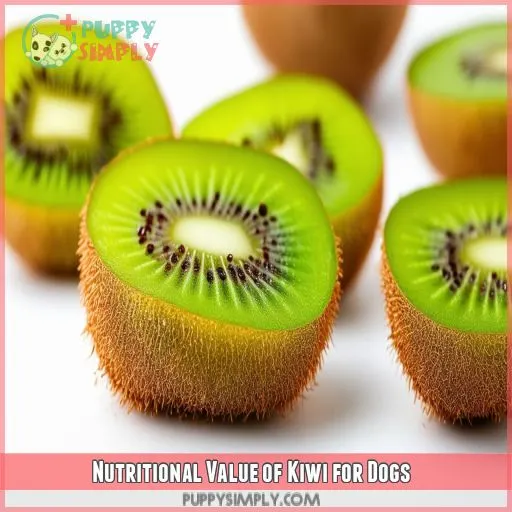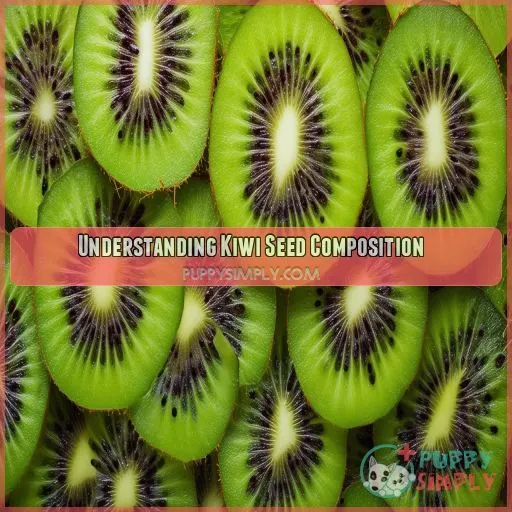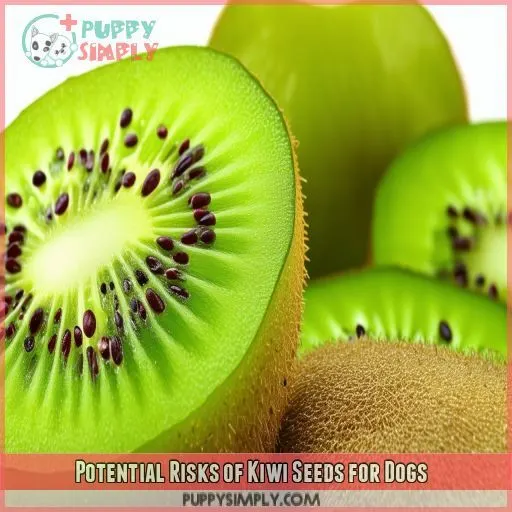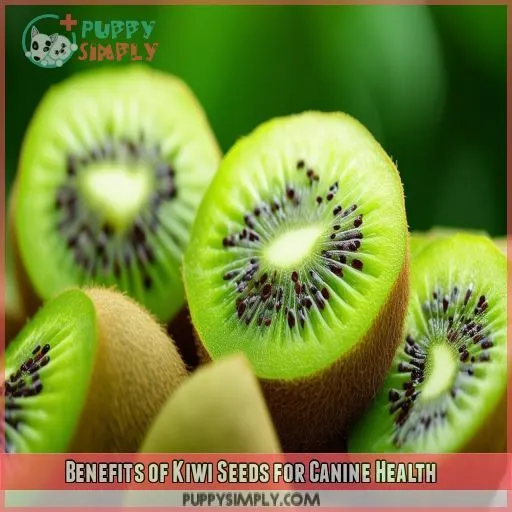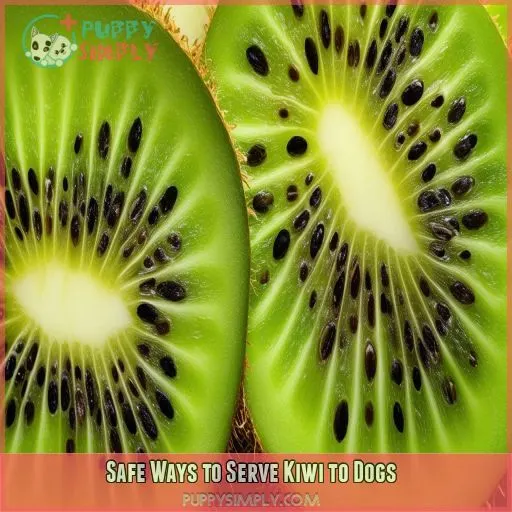This site is supported by our readers. We may earn a commission, at no cost to you, if you purchase through links.
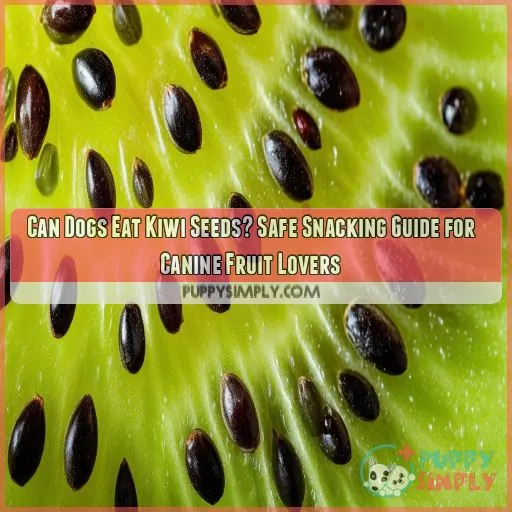 Did you know that 44% of dog owners give their pets fruits as treats? So, if you’re thinking about feeding kiwi to your pet dog these days, you might want to ask: Are kiwi seeds safe for dogs?
Did you know that 44% of dog owners give their pets fruits as treats? So, if you’re thinking about feeding kiwi to your pet dog these days, you might want to ask: Are kiwi seeds safe for dogs?
This guide will dive into answering the question of whether dogs can eat kiwi seeds or not and then take a closer look at nutrition, risks, and benefits.
You will learn how to safely incorporate this exotic fruit into your canine companion’s snack routine so your furry friend gets a delicious treat without compromising their health
Table Of Contents
Key Takeaways
- Kiwi seeds are like tiny ninja stars for your pup’s tummy – while a few won’t unleash canine chaos, it’s best to give them the boot before serving up this tangy treat.
- Think of kiwi as the superfruit sidekick for your furry friend – packed with vitamin C and potassium, it’s like a health potion for their immune system and coat. Just remember, even superheroes need moderation!
- Size matters when it comes to kiwi snacks – a teaspoon for your teacup Chihuahua, a tablespoon for your lovable Lab. Treat it like you would those irresistible puppy-dog eyes – a little goes a long way!
- When in doubt, scoop it out! Channel your inner fruit surgeon and remove those pesky seeds. Your dog will thank you with tail wags and slobbery kisses, minus the potential tummy troubles
Can Dogs Eat Kiwi Seeds?
While kiwis can be a healthy treat for dogs, it’s best to avoid letting them eat kiwi seeds. These tiny, hard seeds pose a choking hazard and may cause digestive issues like upset stomach or constipation. The seeds contain compounds that could potentially be harmful in large quantities.
To safely share kiwi with your furry friend, remove the seeds before serving. Cut the fruit in half and scoop out the center with a spoon.
Offer small portions appropriate for your dog’s size – a teaspoon for small breeds, up to a tablespoon for larger dogs.
Nutritional Value of Kiwi for Dogs
Kiwi fruit is packed with additional nutrition that could be beneficial to the health of your pet. You’ll find that it’s rich in Vitamin C. It has good anti-oxidant properties, enhances your dog’s immune system, and aids in the glossy nature of their coat. Also, it’s an excellent source of Potassium – undoubtedly vital for the effective functioning of the heart and muscle tissues. However, it doesn’t end there; kiwis have enzymes that help in digestion and, as a result, could help in the soothing of tummy troubles in your doggie.
Although those are excellent perks, keep in mind that the kiwi should be a treat or sometimes food and not an everyday dietary staple. Your pup will get most of his nutritious food in a well-balanced dog meal. When giving kiwi, of course, moderation will play an important role. Too much of this sour fruit can cause an upset stomach or diarrhea. Always introduce new foods slowly, and watch for adverse reactions. With some caution in portion control, kiwi can genuinely be that delightful, nutrient-rich snack for your four-legged friend.
Understanding Kiwi Seed Composition
Kiwi seeds are small, black, and crunchy, with a texture that’s noticeable when you eat the fruit. They contain various chemical compounds, including omega-3 fatty acids and fiber, which can impact your dog’s digestion and overall health
Size and Texture
When exploring kiwi seeds for your furry friend, you’ll notice their unique characteristics. Kiwi fruits typically contain 1,000 to 1,200 tiny, black seeds distributed throughout the flesh. These seeds are oval-shaped with a hard seed coat. Their small size and hardness can present challenges for your dog’s digestion. Here’s what you need to know:
- Seed count: Surprisingly numerous
- Seed shape: Oval and compact
- Seed hardness: Tough and resistant
Chemical Compounds
Kiwi seeds pack a powerful punch with their chemical composition. You’ll find cyanogenic glycosides, which can break down into harmless compounds during digestion.
The seeds also contain alkaloids and enzyme inhibitors, potentially affecting nutrient absorption.
Don’t forget about their impressive lipid profiles, rich in healthy fats.
Plus, these tiny powerhouses are loaded with antioxidants, offering a natural boost to your dog’s health
Potential Risks of Kiwi Seeds for Dogs
Kiwi seeds can pose potential risks to your dog’s health if consumed in large quantities. They may present a choking hazard, especially for smaller breeds, and can cause digestive issues such as stomach upset or intestinal blockage if not properly chewed or digested
Choking Hazard
If you feed your furry buddy some kiwi, keep in mind the possibility of choking on the seeds present.
Their small size, round shape, and slippery consistency can choke an animal quickly. This is only worsened by the hard outer shells of the compounds that make up the seed.
The last thing you want is your pup turning their snack into an emergency, so it’s imperative to think about these things beforehand
Digestive Issues
While kiwi seeds aren’t normally a choking hazard, they still can be indigestible for dogs. Your pet may be affected by:
- Upset stomach with nausea/vomiting or diarrhea
- Painful bloating and gas
- Loss of appetite and lethargy
- Uncomfortable constipation
These problems are due to seed impaction, allergic reactions, or nutritional imbalances. In severe cases, overconsumption can even cause pancreatitis. It’s essential to closely monitor your puppy after feeding them new foods.
Benefits of Kiwi Seeds for Canine Health
Kiwi seeds offer potential health benefits for dogs, including a good source of fiber and omega-3 fatty acids. These nutrients can support your dog’s digestive health and contribute to a shiny coat, though it’s important to introduce kiwi seeds gradually and in moderation to your pet’s diet
Fiber Content
Seeds pose some risk to kiwi, but not everything is harmful for your furry friend. These tiny powerhouses, in their own right, have a way of packing dietary fiber.
Soluble and insoluble fiber have essential roles in the dog’s digestive system. Moderate intake of fiber helps regulate bowel movements and maintain gastrointestinal health.
Don’t forget the general rule about fiber digestion: it applies to both you and your dog
Omega-3 Fatty Acids
Kiwi seeds pack a punch with omega-3 fatty acids, offering your furry friend a range of benefits.
These essential fats support your dog’s heart health, boost brain development, and promote a shiny coat. They’re also great for maintaining joint mobility and reducing inflammation.
Safe Ways to Serve Kiwi to Dogs
To safely serve kiwi to your dog, remove the seeds by cutting the fruit in half and scooping them out with a spoon. When offering kiwi as a treat, stick to small portions, giving no more than 1-2 teaspoons for a small dog or 1-2 tablespoons for a larger breed
Seed Removal Techniques
To safely serve kiwi to your furry friend, you’ll need to tackle those pesky seeds. Seed removal methods vary depending on the fruit’s ripeness and your dog’s size.
For smaller pups, use a spoon to scoop out the center, ensuring no seeds remain. Larger dogs might handle the texture, but it’s best to err on the side of caution
Appropriate Portion Sizes
When treating your dog to kiwi, moderation is key. Stick to small portions, about 1-2 teaspoons for small dogs and 1-2 tablespoons for larger breeds.
Limit serving frequency to once or twice a week. Daily intake should never exceed 10% of your pup’s total diet
Frequently Asked Questions (FAQs)
How many kiwi seeds can a dog safely consume?
You shouldn’t feed your dog kiwi seeds intentionally. While a few won’t harm them, it’s best to avoid them altogether. If your pup accidentally eats some, don’t panic. Just monitor them for any unusual behavior
Can kiwi seeds cause allergic reactions in dogs?
While your pup may happily munch on kiwi, the seeds can be a different story. They’re not typically allergenic, but they might cause mild stomach upset. It’s best to remove them before sharing this tangy treat
Do kiwi seeds affect dogs digestive system differently than humans?
Your dog’s digestive system processes kiwi seeds differently than yours. While you can safely digest them, your furry friend’s system may struggle. It’s best to remove seeds before sharing kiwi with your pup
Are kiwi seeds more dangerous for small dog breeds?
Picture a tiny Chihuahua as a delicate flower garden. Kiwi seeds, like small pebbles, might disrupt its fragile ecosystem more easily. You’ll want to be extra cautious with smaller breeds, as they’re more susceptible to digestive issues from these seeds
How long does it take for dogs to digest kiwi seeds?
Your dog’s digestive system typically processes kiwi seeds within 10-24 hours. However, it’s best to avoid feeding them seeds altogether. If you’re concerned, monitor your pup and consult your vet for personalized advice
Conclusion
As the saying goes, "knowledge is power." Armed with this guide, you’re now equipped to make informed decisions about feeding kiwi seeds to your dog.
Always consult your veterinarian before introducing new foods, and enjoy watching your canine companion savor this tasty treat responsibly

